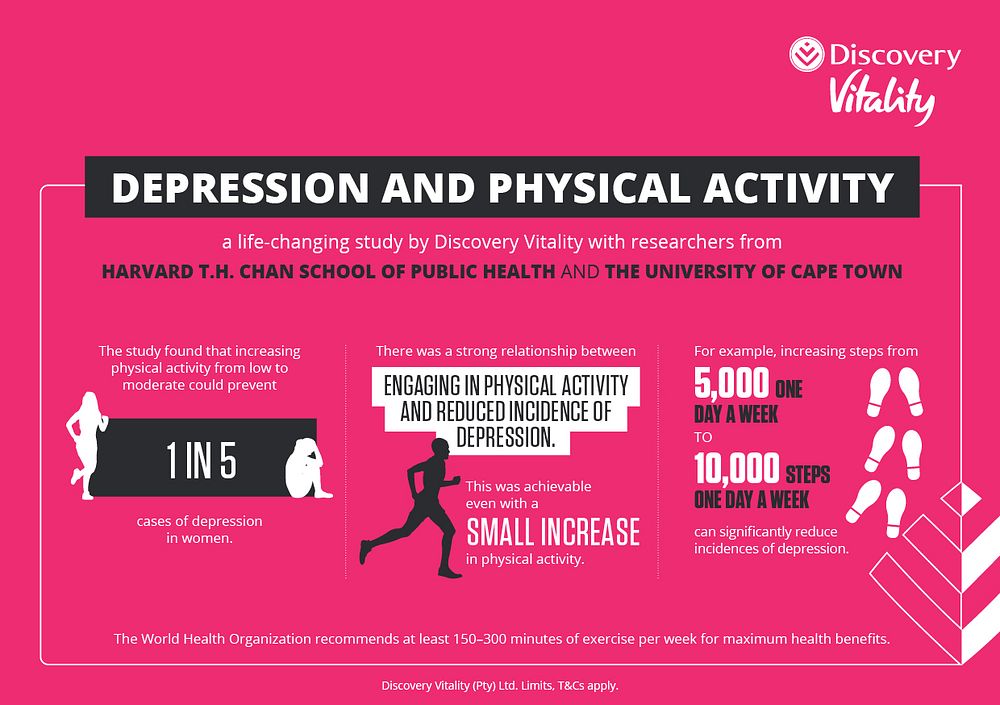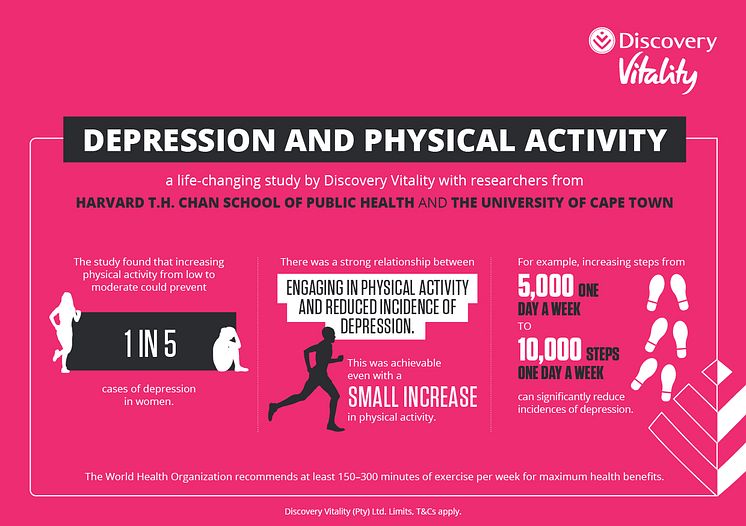
Press release -
Adding one 30-minute workout to their week could change women’s odds of developing depression, study finds
14 October 2022 | A new study, published in the International Journal of Physical Medicine & Rehabilitation, shows that even moderate increases in exercise could help prevent about one-fifth of cases of depression among women.
The research is one of the largest studies to date to examine the effect of exercise on depression in South Africa. Globally, most of the research examining the mental health benefits of physical activity has taken place in high income countries outside of Africa.
“For decades, research on depression has largely focused on treating depression in higher-income countries,” says Vitality’s Head of Wellness Dr Mosima Mabunda, co-author of the paper. “Our study is among the first outside of that context to track a large number of people over time to see how we might prevent depression.”
Mabunda says that while there may be no silver bullet for reducing a person’s risk of depression, the research provides more evidence that physical activity has a vital role to play. She says this is especially important in many countries like South Africa, where treatment remains out of reach for most people living with the condition.
“When we exercise regularly, fascinating things happen in our brains that can help us better deal with stress by, for instance, lowering levels of stress hormones like adrenaline and cortisol,” Mabunda explains. “Regular physical activity has also been shown to reduce anxiety and improve feelings of self-worth.”
The World Health Organization estimates that depression affects one in 20 adults globally. In low-and middle-income countries more than 75% of people living with depression go untreated.
For at least a decade, studies have shown that exercise can reduce the risk of developing depression. In people who are already living with depression, research has also found that physical activity can reduce the severity of symptoms.

Why we embarked on this study
Discovery Health is South Africa’s largest private medical scheme, with more than 3.5 million members. For more than 25 years, Discovery Health members have had access to Discovery Vitality, a behaviour-change and wellness programme that incentivises members to adopt better health, driving and financial behaviors.
To see what effect different levels of physical activity had on depression risk, scientists from organisations including Harvard University and the University of Cape Town reviewed anonymised data from nearly 50,000 Discovery Health and Discovery Vitality members between 2013 to 2015. People included in the study had not been diagnosed with depression in 2013 and had low levels of physical activity as measured by fitness trackers, gym visits or participation in Discovery-sponsored fitness events like fun runs.
As part of the study, scientists compared how people’s exercise habits changed over time with cases of diagnosed depression among the group. The study found that in women with low levels of exercise, moderate increases in physical activity — such as doing even one additional 30-minute workout or 5,000 more steps in a day, every week — could be enough to reduce cases of diagnosed depression by 19% among this group.
Finding solutions for global issues
“At Discovery Vitality, we’ve spent nearly a quarter of a century refining the science behind how to best support people to lead healthier lives,” CEO of Discovery Vitality Dinesh Govender says. “For many, big changes in diet and exercise can seem overwhelming — even if the payoff in better health is huge.”
Govender continues: “This study should encourage people everywhere, especially women, that achieving a simple goal such as walking an additional 5,000 steps, one day a week – as this research found – could make for a healthier, happier life.”
The research found women were almost twice as likely as men to be diagnosed with depression as men, in line with existing global data. Although researchers internationally have speculated a range of factors that could explain women’s higher risk of diagnosed depression, science still can’t say for sure why this occurs.
The study could not show whether increased exercise prevented cases of diagnosed depression among men. Although roughly half of the nearly 50,000 member records included in the research were from men, men’s lower incidence of reported depression likely means the study would have had to include far more men to accurately study the relationship between increased exercise and depression.
Additionally, the results may not be broadly generalisable to South Africans because the research was conducted among a medically-insured population — which represents less than one in five South Africans.
“As a behaviour-change programme, Vitality applies insights from clinical, behavioral and data science to help people live healthier lives. Studies like this showcase the outcome of our efforts to do that and we’re delighted that our data is shaping the way the world thinks about better health,” Govender says.
He says he hopes the research encourages everyone to get moving, even if it means adding in a few extra thousand steps a week. “This study adds to growing research that says you don’t have to be running marathons to start feeling the benefits of exercise.”
You can access the full study here.
Topics
Categories
Discovery information
About Discovery
Discovery Limited is a South African-founded financial services organisation that operates in the healthcare, life assurance, short-term insurance, banking, savings and investment and wellness markets. Since inception in 1992, Discovery has been guided by a clear core purpose – to make people healthier and to enhance and protect their lives. This has manifested in its globally recognised Vitality Shared-Value insurance model, active in 40 markets, impacting 30 million lives. The model is exported and scaled through the Global Vitality Network, an alliance of some of the largest insurers across key markets including AIA (Asia), Ping An (China), Generali (Europe), Sumitomo (Japan), John Hancock (US), Manulife (Canada) and Vitality Life & Health (UK, wholly owned). Discovery trades on the Johannesburg Securities Exchange as DSY.
Follow us on Twitter @Discovery_SA
About Discovery Vitality
Vitality is the largest global platform for behaviour change, underpinning the insurance products of leading insurers worldwide, impacting 30 million lives in 40 markets. The Vitality model, established by Discovery Limited in South Africa, has been incentivising behaviour change amongst its clients for over 25 years. Vitality creates shared value by combining behavioural economics, clinical science, and financial incentives to encourage and reward members for taking steps to improve their health. The model began with a focus on health and wellness and has expanded to include short-term insurance, investments and financial wellness. For more information, please visit the Vitality website or email the Discovery Media Relations team.




